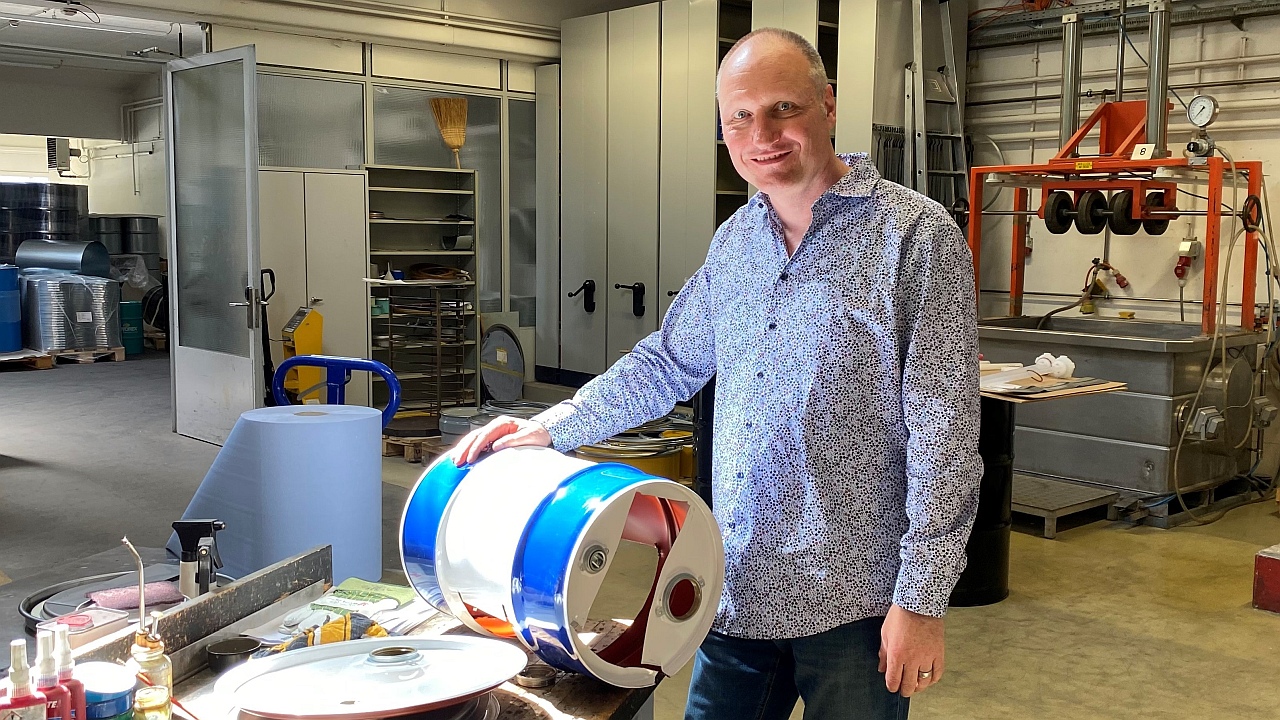Monthly Talk
 | Bernd GeisslerQuality Manager Müller Group
|
"Humor is the fuel for more quality in the Müller Group"
Bernd Geissler (53) is Quality Manager for the entire Müller Group since March 1, 2022. He is keen to ensure that the individual Müller companies exchange information in the area of quality and thus create synergies across the Group. Before taking up the position, he spent 14 years at Müller Plastics building up and leading quality management. As part of the succession plan for Lorenz Spuler, who will retire at the end of 2022, he has been preparing for the new group function since 2021. This includes further training to become a qualified quality manager, which Bernd Geissler will complete this year.

Bernd Geissler, you are at the forefront when it comes to quality at Müller. The two terms quality management and quality assurance are often heard in this context.
At Müller Packaging, quality is divided into the two areas of quality management and quality assurance. With quality management (QM for short), we pursue the goal of achieving the targeted best quality for our products. This is achieved by planning, directing, controlling and improving processes and procedures. As a component of quality management, quality assurance encompasses all organizational and technical measures to subsequently ensure the defined quality of our products throughout.
How are these tasks distributed at Müller?
In every Müller company there is at least one quality assurance representative. In the case of Müller Packaging, we have several. In the Münchenstein team, these are Martin Schwyzer, who works in quality assurance, and Daniel Lisser, who is responsible for all occupational safety and environmental protection. In the Reiden team, Marcel Kappeler (Quality) and Thomas Marti (Occupational Safety and Environmental Protection) are involved. More extensive tasks related to quality are hazardous goods officers and hygiene officers, which also exist in every Müller company.
As Head of Quality Management for the entire Müller Group, you would like to strive for synergies. Can you give a first concrete example?
In the area of hygiene management, two standards are currently in use at Müller Packaging and Müller Plastics. Müller Plastics works with the BRC Global Standard for Packaging Materials and Müller Packaging with the FSSC 22000 management system for food safety. The two standards are of the same nature, although one - FSSC 22000 -- has stricter criteria in certain points. In the future, we would like to work with only one of the two standards. The goal behind this is to gain resources, by reducing duplication and through unified audit procedures.
And which of the two standards should it be?
Clearly, FSSC 22000, because we want to measure ourselves against the strictest criteria. But also because FSSC 22000 is recognized worldwide and is also better known than BRC. FSSC 22000 also has an advantage with regard to recertification. These only take place every three years - not as with the BRC standard, which stipulates an annual rhythm for recertification.
Bernd Geissler, what drives you to work for quality every day?
First of all, as a quality manager, I have insights into almost all areas of the company. I deal with purchasing, with sales, with production planning, with operations, which makes my work extremely exciting. Secondly, in quality work - in a positive sense - you always have to deal with problems, with challenges that have to be solved so that the desired quality does not suffer. Solving these challenges then leads to immediate (positive) feedback that is a pleasure.
What kind of problems and challenges do you mean?
They are of different kinds. For example, when purchased material is faulty. Or if a defect creeps in during production and we notice it during the in-house inspection. Or also in the case of customer complaints, i.e. when the barrels have already been delivered. The challenges also include permanently checking the processes. After all, we want to constantly improve and optimize where it makes sense to do so.
Müller Packaging claims to be the quality leader in the production of industrial packaging made of thin sheet, stainless steel and fiber. Do you agree with this?
We have quality under control. Consistently and permanently. Müller drums can be relied on and they offer all-round protection for filling goods. I can sign off on that. Unfortunately, there is no such thing as zero-defect production, not even for us. Simply because the human factor is still involved. And where work is done, mistakes sometimes happen. And even with machines, things sometimes don't run smoothly.
What do you think about mistakes, which naturally happen?
What's important to me here is that quality control works for us, i.e. that we discover a defect ourselves in Münchenstein and Reiden - and not that quality control is outsourced to the customer. If a customer has to draw our attention to a defect, we have not done our job properly enough internally. Basically, I also believe that we can learn from mistakes. Especially if we can take a close look at the processes and determine the exact source of the error.
And how does Müller Packaging ensure that quality assurance works in-house?
We apply the principle of self-testing. An employee who produces something also subsequently tests his product himself. We have corresponding instructions, test plans and test protocols in place. Then, in the case of high quality requirements, such as barrels that have to comply with food safety, each batch is checked by the quality assurance department, i.e. by Martin Schwyzer or Marcel Kappeler.
Are there other challenges that have landed on your desk, as quality manager, besides keeping your own quality high?
At the moment we have to deal with some tightening of existing regulations. This affects us because interior coatings or sealing compounds previously used on drum lids may no longer be used. This means that we have to work with both suppliers and customers to find new solutions. In the area of sustainability, too, ISO 9001 is no longer up to date and is increasingly being undermined by ISO 14001 (environmental management system) and ISO 45001 (occupational health and safety management system), which have stricter criteria. In the face of such external influences, it is important to be on the ball and to push ahead with the necessary adjustments in the company. There's no use complaining (laughs).
At the end of the interview, let's take a brief look at the audits. What kind of audits are there? How do they work?
An audit examines whether processes, activities or management systems meet defined or required standards, guidelines, standard requirements or legal requirements. There are customer audits, where customers come to check us, and certification audits, where the certification bodies put us through our paces. The difference - simply explained - can be found in the focus. In his audit, the customer wants to see how we manufacture his product and whether his product requirements are met. The standard in the background is therefore of secondary importance in this customer audit. The certification body, on the other hand, looks at the big picture, i.e. the production plant as a whole. It is determined whether the specifications of the standard are met and whether there is potential for improvement. It also assesses whether the originally planned processes are still sensible, efficient and economical.
You are a humorous person. You can often be seen laughing as you walk through the company. You always have a saying ready to go. Does humor help you in everyday business?
Humor is important and, when used correctly, can also help in a difficult business situation. I am simply the way I am. I didn't acquire this sense of humor, it was given to me as a gift. I see humor as fuel for better quality in the Müller Group. An ancient wisdom of the Dakota Indians comes to mind: "If you discover that you are riding a dead horse, get off". So when we have a challenge, it is to analyze and evaluate it. I am against activism, so I would never introduce performance incentives for dead horses or use a supervisor to improve communication between me and the dead horse. Evaluating what exists, optimizing processes, adapting to future challenges at an early stage, that is quality awareness that brings joy and always gives me a laugh.
Now we have talked a lot about quality management. There was not enough time to visit the test laboratory today. We will certainly come back in one of the other monthly windows, because we are interested in the tests that you, or Martin Schwyzer, carry out here. But for today, thank you very much for the interview, Mr. Geissler.
